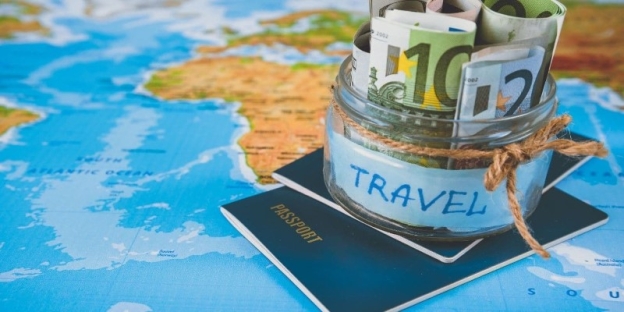car
Discover 2025 Chevy Silverado Deals That Could Change Your Ride
1757926296000
What will you spend each day while travelling? That depends on how accurately you calculate your daily travel budget and how well you adjust to real-time currency rates. Let's explore a practical approach to planning, tracking, and managing your costs while on the go.
What will you spend each day while travelling? That depends on how accurately you calculate your daily travel budget and how well you adjust to real-time currency rates. Let's explore a practical approach to planning, tracking, and managing your costs while on the go.
Every trip starts with a number. Say your full budget is $2,400 for 15 days. That gives you a base of $160/day. But here’s the mistake many people make: sticking rigidly to that number no matter what changes on the ground.

Instead, treat it as an average. Spend less on simple days (such as transit, beach, or walking tours) and allocate more for expensive ones (like day trips, entry fees, or guided tours). The more flexible you are, the better your travel cost tracking will reflect actual needs rather than fixed expectations.
And if you're visiting different countries, create separate budgets for each. Spending $80 a day in Hanoi is doable. That same $80 won't last in Zurich. Your daily travel budget must adapt to where you are and what things cost there, not where you were before.
It's easy to think a few cents change in an exchange rate won't matter. However, over the course of a two-week trip, those small changes can have a significant impact on your bottom line.
For example, you might arrive in Japan when $1 is equivalent to ¥155. A few days later, the rate drops to ¥150. Now your $100 budget gives you ¥500 less to spend. If you're not adjusting for this, you'll either spend too much or cut back suddenly.
Using apps like XE Currency, Revolut, or Currency Converter Plus, you can check real-time currency rates each morning. Set your daily allowance using those live numbers. If the rate improves, maybe today’s the day to book that slightly pricey experience. If it drops, scale back on optional spending.
This habit keeps you aware and in control of what your money can buy right now, not what it could buy when you left home.
You don't need to track every cent, but you do need a system in place to manage your finances effectively. Logging your costs at the end of the day is better than not at all. However, logging them in real-time, right after you spend, gives you the most accurate picture of how you're doing.
Apps like Trail Wallet, TravelSpend, or Spendee help with this. They allow you to set a daily travel budget, track categories such as food, transportation, and accommodation, and update expenses in both local and home currencies.
If you don't want an app, a simple spreadsheet will also work. Just make sure to include the date, item, amount, local currency, exchange rate that day, and converted total. Update your running daily total as you go. This creates an accurate picture of what you're spending and where you might need to make cuts.
Let's say you're travelling through Croatia, Hungary, and Austria over 12 days. These are three countries, each with its currency (the euro, forint, and kuna), and three sets of local prices. Using the same daily travel budget each week won't make sense.
In Hungary, you might live well on $70/day. In Austria, you’ll need at least $130. Your travel cost tracking has to adjust to reflect that. Look up average costs before you arrive. Websites like Budget Your Trip, Numbeo, or Nomad List can give you live updates based on user-submitted data.
Adjust your daily budget for each country and convert it using real-time currency rates when you arrive. This lets you travel comfortably without running out of money midway through.
Using a travel-friendly card makes tracking travel costs easier. Cards from Wise, Revolut, or Charles Schwab give real-time notifications, apply live exchange rates, and often skip foreign transaction fees.

You'll know exactly how much something costs in your home currency the second you pay. This is a significant advantage when trying to stay within a daily travel budget.
That said, many countries still lean heavily on cash, especially for local markets, taxis, and small restaurants. In places like Vietnam, Morocco, or rural Italy, having cash on hand is still essential.
A good mix is usually best: use your card for major purchases and local ATMs for day-to-day spending. Make sure to record both in one place—don't split your tracking across multiple methods, as you'll lose the thread.
Many travellers set a rough number for each day based on what they think they'll spend. That approach works only for a short while—until exchange rates shift, local prices surprise you, or one spontaneous activity throws off your whole plan.
Without using real-time currency rates or tracking daily expenses, you're working off outdated numbers. That creates blind spots. If you're in a new country where prices fluctuate or exchange rates are volatile, your original daily figure becomes unreliable quickly.
Let's say you're budgeting $120/day in Europe. If the dollar weakens and the euro rate changes, your daily budget loses value overnight. Now your $120 buys less, even though you're spending the same in local currency. That's how travellers often overspend without even realising it.
This is why travel cost tracking should happen as you go, not just before or after the trip. With the right tools and a few consistent habits, your daily travel budget can keep up with real-world costs in real time.
A travel budget isn’t something you set once and forget. It needs to be updated, watched, and adjusted—just like the journey itself.
With accurate travel cost tracking, daily adjustments using real-time currency rates, and a reliable budget trip tool, you can stay entirely in control without feeling restricted. You won't miss experiences, and you won't overspend.
The key is to keep your budget flexible, your numbers current, and your decisions grounded in what your money is worth today. That's how you make your trip stress-free—and your wallet happy from start to finish.